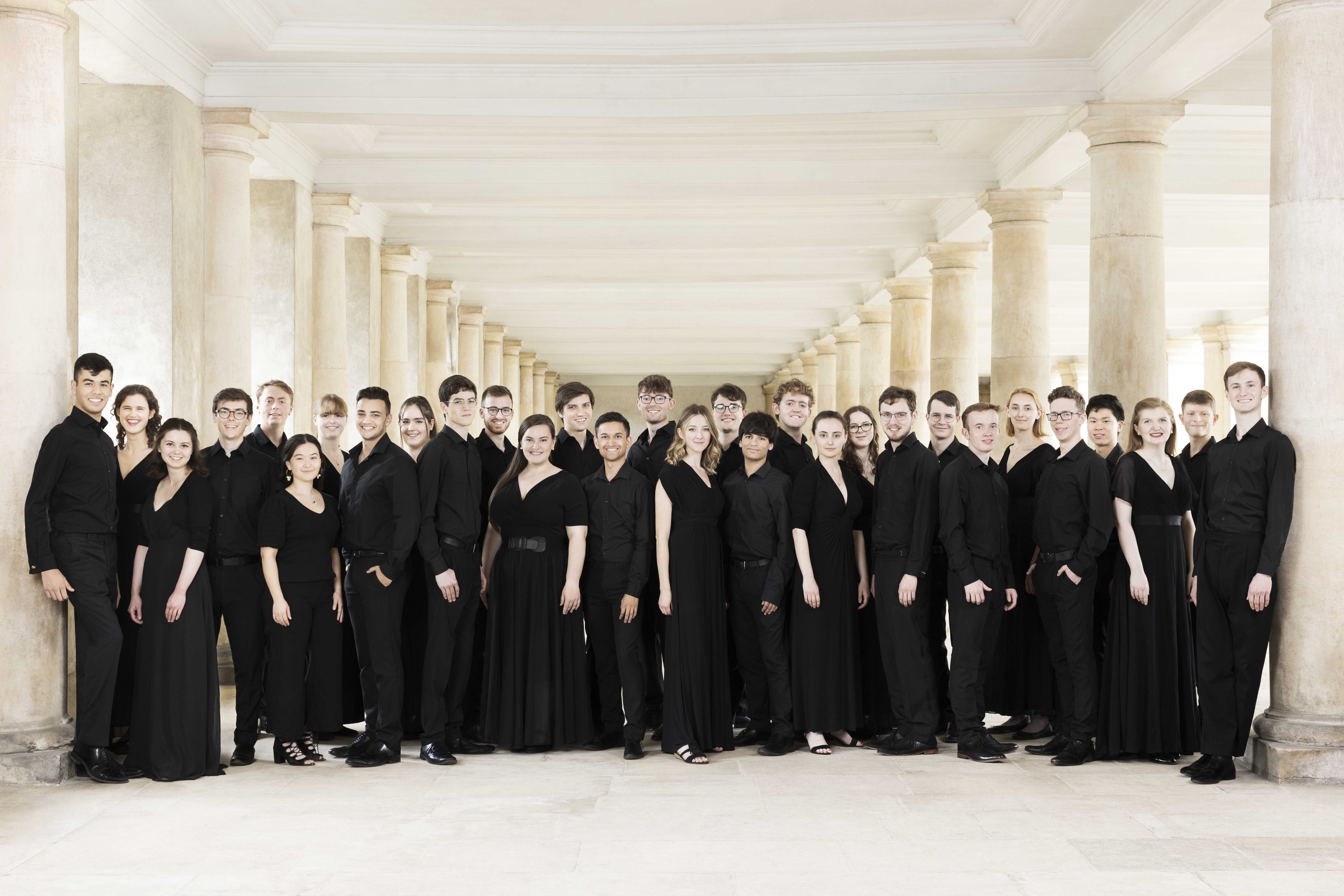Germany Tour, Jul 2013 - Kölner Stadt-Anzeiger
> See concert details...See below for English Translation
Meister aus England
Konzert: Der Chor des Trinity College Cambridge begeistert in St. Pantaleon
Innenstadt. Schon der erste Eindruck in St. Pantaleon ist überwältigend. Der Chor des Trinity College Cambridge beginnt sein Konzert mit einem Marienlob von Arvo Pärt so glasklar, wie es nur ganz wenige Spitzenchöre schaffen. Die lupenreine Intonation der 32 Sängerinnen und Sänger bringt aparte Harmonien zum Leuchten. Da hüpft beim Hören das Herz. Und obwohl im Chor nicht nur Musikstudierende singen, lässt sich erstmals kein Dirigent blicken , auch nicht für die A-Capella-Sätze der englischen Renaissance.
Der Chor zeigt ganz allein und mit Glanz, wie Thomas Tallis in der siebenstimmigen Pfingstmotette das hohe Fest feiert und das berühmte “Zungenreden” vor Ohren führt. Später kommt der Leiter Stephen Layton. Er stellt im Programm der Deutschlandtournee Bezüge her zwischen alter Musik bis zum Barock und allerneuesten Schöpfungen . Das tun auch viele Komponisten heute, sie überspringen Klassik und Romantik. Lieber greifen zum Beispiel der Este Pärt, der Lette Eriks Esenvalds oder der Brite Peter Bannister weit zurück auf den einstimmigen gregorianischen Gesang, auf solistische Vorsänger, auf das fromme Rezitieren auf nur einem Ton.
Und weil der Chor das alles perfekt realisieren kann, ist es umso spannender zu entdecken, was Komponisten im 21. Jahrhunderts zum alten Erbe einfällt. Esenvald lässt in “Let the people praise” einstimmig singen, aber am Ende der Verse spreizt er den Chorklang. Die scharfen Klänge steigert der Leiter bis ins extrem Laute, das sich ins Ohr brennt. Bannister dagegen überrascht mit einem alten dogmatischen Text aus Nordirland. Die frommen Glaubensartikel hüllt der Chor vielstimmig, aber superleise ein – das klingt nach Mystery.
Mit kontrastierenden A-Capella-Sätzen von 1941 ist Francis Poulenc vertreten. Im Gebet “Salve Regina” macht die Musik das Seufzen und Flehen sinnlich erfahrbar. Hingegen feiert sein “Exultate Deo” das Gotteslobüber ein Lob der Musikanten. Wo der Psalmtext von Posaunen spricht, dreht der Chor wieder voll auf. Virtuos und leichtfüßig lassen die Sängerinnen und Sänger Bachs Motette “Lobet den Herrn alle Heiden” erklingen, das einzige Stück mit Begleitung. Leider driften Gesang und Chororgel manchmal auseinander.
Schöne Orgel-Intermezzi
Für schöne Intermezzi an der Klais-Orgel auf dem Lettner sorgt Jeremy Cole. Der junge Organist spielt Werke von Bach (BWV 542 und 649) ruhevoll und strukturklar. Bravo für die Meister aus Cambridge. Der Chor steht an der Musikhochschule übrigens auch für eine Meisterklasse zur Verfügung. Damit haben Chorleiter zum Üben ein Spitzeninstrument.
————————————————————————————————————————
English masters
Concert: The Choir of Trinity College Cambridge enthralls the audience in the St Pantaleon church
City Centre. The very first impression in the St Pantaleon church is staggering. The Choir of Trinity College Cambridge commences the concert with a laudation to Mary by Arvo Pärt with such crystal clear sound as only a few top-ranking choirs are able to produce. The flawless intonation of the thirty-two singers makes striking harmonies glow and the heart makes a leap whilst listening. And although the choir does not only comprise music students, there is no conductor to be seen, not even for the A-capella settings of English Renaissance music.
All on its own, the choir demonstrates with brilliance, how Thomas Tallis’ seven-part Pentecost motet celebrates the High Feast and displays the famous ‘Loquebantur variis linguis’. Finally, the conductor Stephen Layton comes onto the stage. In their Germany tour programme, he sets up connections between Early Music, the Baroque era and brand new creations. A lot of composers today do the same and skip the Classic and Romantic era. As such, the Estonian Pärt, the Latvian Eriks Esenvalds or the English composer Peter Bannister prefer to hark back to the monophonic Gregorian chant, to soloist cantors and to the pious recital on a single note.
And since the choir manages to accomplish all of this so perfectly, it is all the more exciting to discover the ideas of 21st century composers concerning the old heritage. In ‘Let the people praise’, Esenvalds lets the choir sing in unison before splaying out the sound. The conductor increases sharp sounds into their extremes, making the audience’s ears burn. On the other hand, Bannister surprises with an ancient dogmatic text from Northern Ireland. The choir envelops the devout article of faith in the quietest polyphony – a sound of mystery.
Francis Poulenc is represented with contrasting A-capella settings from 1941. The music of the prayer ‘Salve Regina’, allows the audience to experience its sighing and supplication. However, his ‘Exultate Deo’ celebrates God through an appraisal of the musicians. Where the text of the psalm speaks of trombones, the choir unleashes its sound. Bach’s motet ‘Lobet den Herrn alle Heiden’, the only accompanied piece, is performed with virtuosity and lightness. Unfortunately, the singing and the choir organ sometimes drift apart.
Beautiful organ intermezzi
Jeremy Cole on the Klais organ catered for some beautiful organ intermezzi. The young organist performed pieces by Bach (BWV 542 and 649) with the necessary calmness and vivid structure. A ‘bravo’ to the masters from Cambridge. The choir will give a masterclass at the ‘Musikhochschule’, thus the invited conductors will have a top class instrument at their disposal.
© Alexander Gebhard
